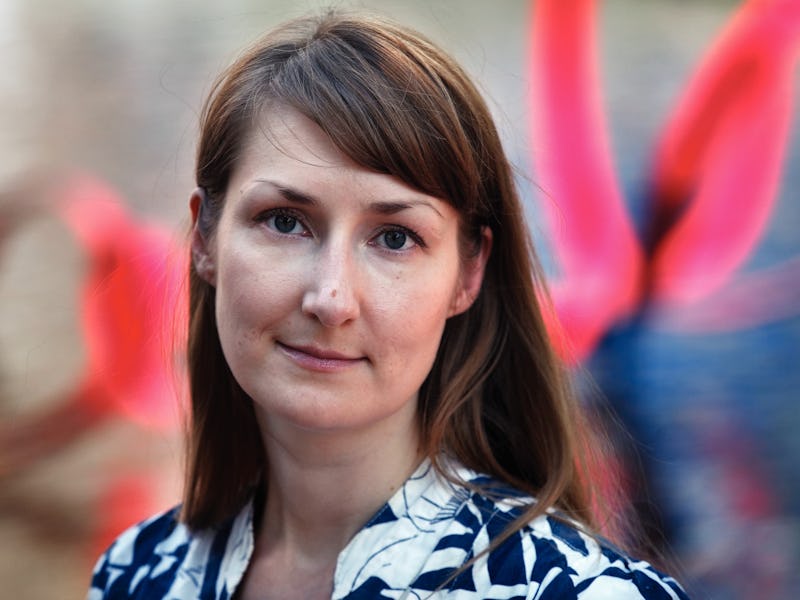ASK A PROPHET | Emmi Itäranta Says Sci-Fi Is the Key to Earth's Future
The author of 'Memory of Water' and 'The Weaver' talks Finnish vs. American sci-fi and the importance of compassion.

In Ask a Prophet, we use our alien probes on the brains of sci-fi, fantasy, and speculative fiction writers.
This week, we spoke with Finnish author Emmi Itäranta, whose dystopian novel Memory of Water was nominated for the Philip K. Dick Award, the Golden Tentacle Award, and the Arthur C. Clarke Award. Her most recent novel is The Weaver.
What usually comes first to you when you’re writing — the world of your story or its characters?
My stories often start with an initial image that already contains the main character and some core feature of the world. The Weaver began as an image of women weaving and unravelling streets and walls in a strange city, and I knew my main character had to be one of these women. My debut novel Memory of Water started as an image of a young woman preparing tea with the last remaining drop of water she had left. I keep learning about the characters and the world throughout the writing process, but the initial spark tends to contain both in some shape or form.
Did you do much outside reading for research?
I always try to read widely around the subject(s) central to whatever I’m working on, so yes — I mainly focused on the history of Venice, which served as one of the models for the unnamed setting of The Weaver. I also read on the practice and mythology of weaving, and on phenomena connected to sleep, such as sleep paralysis and lucid dreaming.
What’s the most interesting thing you read that didn’t make it into the story?
Only a fraction of the research made it into the novel, but one thing that stuck with me was about the Bohemian Crown Jewels! I wrote the very first snippets of The Weaver in Prague. When visiting Prague Castle, I learned that the Crown Jewels are kept behind seven locks and seven different people hold the keys. It sounded like out of a fantasy novel to me, so I originally intended to incorporate it into the story. I abandoned the idea because it didn’t really fit in, but may use it somewhere else one day.
Since sci-fi has experienced a boom in popularity, what excites you most about its increased prominence?
For me, sci-fi has always been a place of freedom of imagination more than any other genre, and I’m excited to see it moving towards a greater awareness of diversity, although much remains to be done. It can speculate endlessly about futures and alternate presents, and it can envision the first steps towards progress, whether technological, social, intellectual or otherwise. The world has seemed rather dystopian lately, so we sorely need imaginations capable of transforming this. I think sci-fi is uniquely suited for functioning as a blueprint for positive futures.
What have you noticed is the main difference between the Finnish sci-fi traditions and U.S./UK sci-fi traditions?
I feel that Finnish sci-fi tends to be heavily rooted in realism. It’s common for Finnish sci-fi stories to take place in a world that closely resembles contemporary Finnish reality but then add an unexpected twist that shows everything in a strange light. There are more and more Finnish authors writing stories set in entirely imaginary worlds — fantasy and steampunk are quite popular at the moment — but I’d say the “twist on realism” approach is still very characteristic, more so than in the U.S./UK. I think this may be connected to the fact that realistic fiction has for a long time held the mainstream position of “serious” literature in Finland. In such a small country sci-fi has had to carve a niche for itself through incorporating this tradition.
What are some interesting novels you’ve read recently? Are there any sci-fi shows you currently follow?
I absolutely loved Elysium by Jennifer Marie Brissett, The Book of the Unnamed Midwife by Meg Elison and Maresi by Maria Turtschaninoff. I’m currently reading Hag-seed, Margaret Atwood’s retelling of The Tempest by Shakespeare, and as usual, I’m in awe of her writing.
I’m four episodes into Season 3 of Black Mirror, which I think is superb so far. I was also impressed with Stranger Things when I recently saw it, and Expanse and Westworld are on my immediate to-watch list.
What are you most anticipating about the future?
I travel all the time, so teleportation technology! In seriousness, though: The day when humans have evolved enough towards greater compassion that the planet actually has a chance of recovering from all disasters we have wrought upon it. I don’t know if I will see that within my lifetime, but I need to believe that is where we are eventually going as a species. Nothing else makes much sense, or gives hope for the future.
This interview has been edited for brevity and clarity.